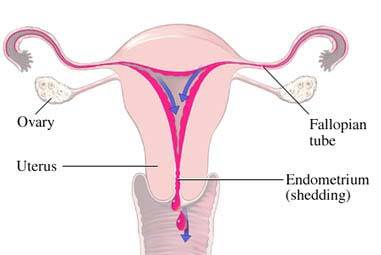Treatment options from your local gynecologist typically include avoiding certain foods, managing stress, and, in rare cases, surgery. To learn more about your specific treatment options, make an appointment with our doctors at Midtown Gynecology center in New York. He will be able to discuss your treatment options once he has determined the cause of your amenorrhea. Our clinic offers a full range of gynecologic services, from annual check-ups and routine pap smears to the most complex GYN procedures and surgeries for women of all ages, both in our office and at the hospital.
Amenorrhea
 Amenorrhea is the medical term for missed menstrual periods. Pronounced uh-men-o-REE-uh, the condition refers to young women who should have their periods and don’t or women who have missed a period when they should have had one.
Amenorrhea is the medical term for missed menstrual periods. Pronounced uh-men-o-REE-uh, the condition refers to young women who should have their periods and don’t or women who have missed a period when they should have had one.
While amenorrhea is common in pregnancy or menopause, it can also signify that something in the body isn’t functioning correctly. The most common cause of missing your period is pregnancy. Other problems can include imbalanced hormones or structural issues with the reproductive tract. Amenorrhea should always be evaluated with a thorough consultation and examination by a gynecologist for an accurate diagnosis and treatment plan as it may be a symptom or sign of a severe illness or condition.
Primary Amenorrhea and Secondary Amenorrhea
Amenorrhea has two main categories: primary and secondary. If you have never had a menstrual period, you likely have primary amenorrhea. Causes of primary amenorrhea can include:
- Age
- Improperly formed reproductive organs
- Ovary failure
- Hormone dysfunction
Secondary amenorrhea covers the rest of the reasons that you may miss periods or completely stop menstruating. In addition to pregnancy and menopause, you might develop secondary amenorrhea because:
- Birth control pills are affecting your periods
- You’re breastfeeding
- You have an Intrauterine device (IUD) in place
- You’ve had your ovaries or uterus removed
Because menstruation has close ties to hormone production, several lifestyle habits, diet, and other physical changes can disrupt your menstrual cycle. Other issues that could cause amenorrhea are:
- Stress
- Too much exercising called exercise-induced amenorrhea
- Poor nutrition
- Extreme weight gain or loss
- Depression
- Ongoing medical issues
- Prescribed and illegal drugs
- Obesity
- Tumors on your uterus
- Thyroid gland problems, a rare condition also called hypothalamic amenorrhea
Absence of Menstruation
The main symptom that you’ll have to indicate that you may have amenorrhea is the absence of menstruation. In other words, you’re not getting your monthly period. Amenorrhea should always be evaluated with a thorough consultation and examination by a gynecologist for an accurate diagnosis and treatment plan as it may be a symptom or sign of a serious illness or condition.
If you have missed or are missing menstrual periods, you should see your NYC OBGYN immediately and take note of other things you may be experiencing such as:
- Possible pregnancy
- Pelvic pain
- Excessive hair growth on your face
- Hair loss
- Headaches
- Nipple discharge that looks milky
- Acne
- Changes in your vision
- A list of medications you are taking
Drastic weight change can trigger abnormalities in your menstrual cycle
Diagnosing Amenorrhea
Sometimes, finding the cause of amenorrhea can be challenging for you and your gynecologist. The specialist may ask you to assist in making a diagnosis by keeping a careful journal of your periods, how long they last and how heavy the blood flow is. Additionally, always tell our specialist at Manhattan gynecology practice about any other recent changes you’ve made in your life.
You’re at a higher risk of developing the menstrual cycle condition if there is. Other factors that put you at a higher risk include:
- Eating disorders, such as bulimia or anorexia
- Alcoholism or substance abuse
- Extreme physical training programs
Complications Can Occur
Some women may enjoy the prospect of not dealing with the monthly cycles, such as those with amenorrhea and pregnancy. It’s also considered one of the perks of getting old enough to go through menopause. But losing your normal menstrual cycle can signal other, more severe complications that you may otherwise never have known about, including:
- Infertility
- Osteoporosis
- Low estrogen levels
- Tumors
- Malnutrition
- Delayed sexual development
Testing for Amenorrhea
 Amenorrhea isn’t always a problem or “condition” that needs treatment. Amenorrhea due to pregnancy or menopause is usually normal and can signify a different stage in your life. With that said, discovering the cause of Amenorrhea is essential. Thus an evaluation by an experienced gynecologist in Midtown Manhattan, is vitally important for an accurate diagnosis and appropriate treatment plan.
Amenorrhea isn’t always a problem or “condition” that needs treatment. Amenorrhea due to pregnancy or menopause is usually normal and can signify a different stage in your life. With that said, discovering the cause of Amenorrhea is essential. Thus an evaluation by an experienced gynecologist in Midtown Manhattan, is vitally important for an accurate diagnosis and appropriate treatment plan.
In addition to relying on your self-reporting lifestyle changes and menstrual calendar and activity, you may have to undergo tests to find the root of your disorder. These can include:
- Pregnancy test — certainly the first test when trying to figure it out
- Male hormone test to see if your body is producing an abnormal amount of testosterone
- Thyroid function test to ensure the proper functioning of the gland
- Pituitary gland check with a prolactin test that looks for tumors
- Ovary function tests to see if they are working properly
- Hormone challenge test, where you take various hormones for several days to see if they cause you to start menstruating, thereby discovering the missing link
- Imaging tests such as an MRI, ultrasound, or CT scan to help determine whether you have abnormal growths or deformities in your reproductive organs
- Hysteroscopy or endometrial biopsy, to see and diagnose problems with the lining of the uterus, the part that you should see as blood when you menstruate
When Treatment Is Required
After diagnosing the cause of amenorrhea, your doctor will discuss treatment options, some ranging from dietary modifications, managing stress, medications, and in rare cases, surgery. To find out more about your specific treatment options, come to our Midtown gynecology office in New York for an appointment with our doctors to determine an accurate diagnosis and, with your help can discuss a treatment plan that works for you.
Typical treatments for secondary amenorrhea include lifestyle changes for which you may need additional help from a counselor, nutritionist, or physical therapist. Common amenorrhea treatments may also include:
- Learning new ways to manage stress, such as meditation or yoga
- Changing the ways and levels that you exercise
- Losing weight if you’re obese
- Gaining weight if you’re underweight
- Taking hormone supplements such as estrogen replacement therapy
- Trying different birth control options
- Surgery to remove things that may be stopping your uterus from menstruating regularly. The specialist may recommend surgery if you have scarring in your uterus or cervix from a c-section or recent infection.
Though surgical interventions are rare, your doctor might recommend them if a pituitary tumor doesn’t respond to medications. The pressure that it puts on your gland not only causes amenorrhea but also increases the pressure on nearby blood vessels and on your optic nerves, which can lead to blindness. Surgery also may be recommended if you have scarring on your uterus following a C-section or a D&C.
Have questions about Amenorrhea? Schedule an appointment by contacting our office in Manhattan today.
Updated on Sep 23, 2023 by Manhattan Women’s Health and Wellness
Best-in-class
New York Gynecology Clinic
Manhattan Specialty Care in the Press

Call now to make an appointment with our highly rated Manhattan Gynecology doctors regarding your health. We look forward to seeing you!
book online now
(212) 378-9985
New York City Locations:
Manhattan Women's Health & Wellness (Upper East Side)
983 Park Ave, Ste 1D17
New York, NY 10028
(212) 389-1904
Manhattan Women's Health & Wellness (Midtown)
56 W 45th St, Ste 815
New York, NY 10010
(212) 677-7654
Manhattan Women's Health & Wellness (Union Square)
55 W 17th St, Ste 104
New York, NY 10011
(212) 378-9985